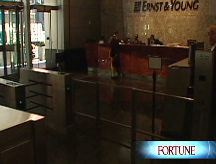Why '09 may be better
It won't be a pretty year but some think that the seeds of both an economic and market recovery will be planted sometime in 2009.
NEW YORK (CNNMoney.com) -- Here's hoping that 2009 is a better year than 2008. It's hard to imagine how it could be much worse.
The economy has been in recession all year. Housing prices have plunged. Nearly 2 million jobs have been lost. The S&P 500 has plummeted more than 40% this year.
So what's going to happen with the economy and markets next year? Well, sorry to disappoint many of my doom and gloom readers out there -- I'm going to take a page from Stephen Colbert and dub you Depressionistas -- but I think the economy will slowly start to gain momentum sometime late next year.
Yes, it will feel like *!&@ for awhile.
"We should get tentative signs of recovery by late in the year. But I can't remember a more unsettled outlook. We have issue after issue that is largely unresolved," said Joe Liro, an economist with Stone & McCarthy Research Associates in Princeton, N.J.
But it's important to note that this still appears to be a long, painful recession and not another depression.
"We are in the eye of the storm. The fourth quarter of this year and first quarter of 2009 will be bad. But this is probably the worst of it. We should see banks becoming more willing to lend by the end of the first quarter," Liro said.
And the main reason for this is that the Federal Reserve has been extremely busy doing everything it can to prevent a full-blown depression.
Even though it may seem like nothing that the Fed has done has helped, the many moves taken by the central bank will eventually have their desired effect.
You can accuse the Fed of many things, but sloth is not one of them. The sheer amount of moves that Ben Bernanke and Co. have taken in 2008 is staggering.
Most notably, the Fed has slashed interest rates to near zero. Sooner or later, that should help boost corporate profits and, in turn, help companies feel comfortable about hiring again.
"The most important things for the market are interest rates and earnings. Historically when rates are low, that usually fuels gains for the market. At some point, we will get positive surprises from companies in 2009," said Eugene Peroni, senior vice president and portfolio manager with Advisors Asset Management, an institutional investment firm based in Monument, Colo.
Beyond the garden variety interest rate cuts, the Fed has launched several creative lending programs to defrost the credit markets. Some of that has started to work, particularly with mortgage rates.
In addition, the incoming Obama administration is expected to propose a massive stimulus package geared toward job creation and infrastructure building. That too, could provide a lift to the economy later in the year.
And with all that in mind, it's worth remembering that the stock markets often anticipate recoveries. So even though the economic numbers and corporate earnings reported released early next year will probably be horrific, investors may look past that.
"Our view is that most of the damage has been done. Between the monetary stimulus that is coming as a near flood and the credit markets behaving a little better and loosening up, that should set the stage for a sustained rally," said Matthew Kaufler, portfolio manager with Federated Clover Investment Advisors, a money management firm based in Rochester.
People feel lousy about the economy. I understand that. I'm not trying to sugarcoat things and say that everything is OK. For many Americans, this is the worst economic downturn they have ever had to experience.
And I am by no means defending former John McCain adviser Phil Gramm, who infamously declared that this was a "mental" recession and that the United States is a "nation of whiners." But in some respects, the mood about the economy and markets right now is overly pessimistic.
"The biggest problem facing the market this year is confidence. But a lot of the bad news may already be discounted by the market," said Peroni.
At some point, investors will realize that the sky isn't really falling. And sentiment could wind up turning on a dime.
"Change happens relatively quickly and often times unexpectedly in both directions," Kaufler said. "What will snap us out of this? It will be bad news that isn't as bad as people fear."
Thanks to all the readers of The Buzz! This is the last column of 2008. The Buzz will be back on Jan. 5. But I want to thank all my readers for emailing and contributing their opinions about the markets and economy on the Talkback page.
I've written about 200 Buzz columns this year, and there have been nearly 9,000 Talkback comments. And it is that feedback, negative and positive, which makes this column such a rewarding experience to write. Happy holidays to all of you and best wishes for a healthy, prosperous 2009! ![]()




